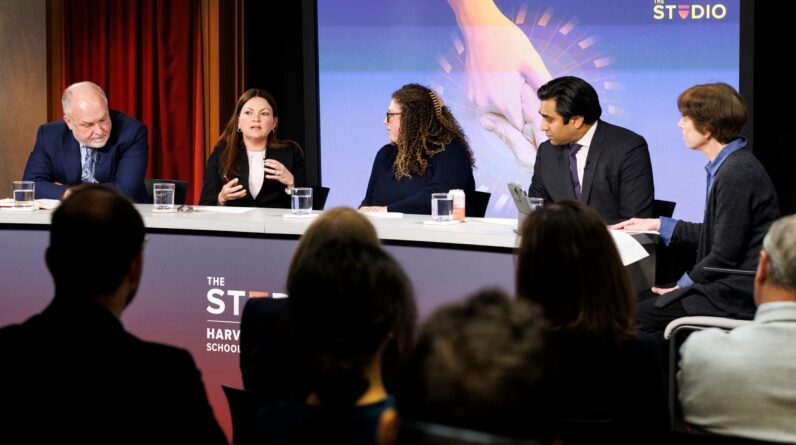
Now, because the very considered a U.S. firm partnering in tech tasks in China attracts scrutiny from lawmakers, nationwide safety hawks, and human rights advocates, Microsoft may be compelled to grapple with robust selections surrounding the thriving AI ecosystem it fostered there.
Microsoft established its analysis lab in Beijing in 1998, when it was a pioneer paving the best way for AI analysis and enterprise collaborations between the U.S. and China. It was three years earlier than China joined the World Commerce Group, a time when President Invoice Clinton actively pushed for nearer commerce ties with the nation, and when AI was largely the stuff of sci-fi pipe desires.
Since then, Microsoft Analysis Asia, or MSRA, has been often called one of many most influential hubs of AI analysis on the planet, advancing speech recognition, pure language and picture processing, and different deep-learning work, spreading its discoveries far and vast.
Components of analysis carried out at MSR China have been used to construct Microsoft’s promoting, chatbots, Bing search, Home windows, Xbox, Azure Cloud, and different merchandise used all over the place. Individuals who honed their expertise at MSRA have moved on to assist create and develop a few of China’s best-known tech companies driving AI within the nation and throughout the globe, together with Alibaba, Baidu, and Tencent, in addition to extra controversial AI suppliers, together with facial-recognition firm Megvii.
“Principally you may argue that Microsoft Analysis Asia was the kind of seed capital from which numerous Chinese language AI firms and researchers and the sector actually developed,” stated Paul Triolo, senior vp targeted on China at international strategic consultancy Albright Stonebridge Group. “It’s confirmed to be a catalyst for the trade.”
Microsoft’s storied lab in Beijing has helped the corporate domesticate AI expertise and higher perceive China’s huge market. In 2018, Microsoft stated it had invested greater than $1 billion in analysis and improvement in China over the earlier decade.
Principally you may argue that Microsoft Analysis Asia was the kind of seed capital from which numerous Chinese language AI firms and researchers and the sector actually developed.
There are greater than 300 scientists and engineers working at its MSRA labs in Beijing and Shanghai, however Microsoft has a a lot bigger analysis and improvement group consisting of 6,000 scientists and engineers in Beijing, Shanghai, Shenzhen, and Suzhou in addition to in Taiwan and Japan. That group, which features a staff targeted on Cloud and AI applied sciences, helps rework analysis from MSRA into Microsoft services and products.
To assist it get there, Microsoft has nurtured shut ties with universities in addition to state and native governments within the nation.
Earlier than the Trump administration launched its China initiative in 2018, “MSRA’s China authorities hyperlinks would have been considered as a significant constructive,” Triolo stated.
However now the “D-word” is on many lips: decoupling. “Quick ahead to the present state of affairs, and being favored by the Chinese language authorities is clearly considered in Washington as a significant destructive,” Triolo stated. “However the hyperlinks are fairly deep and sophisticated, and can’t be unraveled that simply, neither is there a powerful want on both facet to interrupt these ties.”
Nonetheless, Microsoft has made some adjustments. When the U.S. Treasury Division included China’s drone tech large DJI on a listing of sanctioned firms in December 2021, Microsoft ended a partnership with the corporate, which has been beforehand unreported. It has additionally been rumored that Microsoft has stopped recruiting from some Chinese language universities.
Variety of thought
When Microsoft opened an AI Innovation Heart in Shanghai at the side of the Xuhui District authorities and a state-owned enterprise group there in 2018, the mayor of the district, Fang Shizhong, praised different “profitable” collaborations with Microsoft, akin to a startup accelerator program known as Microsoft ScaleUp Shanghai.
The heart would “additional increase the depth and breadth of cooperation between Microsoft and Xuhui District, and can play an energetic function in bringing collectively abilities, accelerating improvement, and main innovation,” he stated.
MSRA researchers have additionally assisted native Chinese language firms on tasks. In 2017, Xianyuan Zhan, a former MSRA affiliate researcher who acquired his Ph.D. from Indiana’s Purdue College, helped vitality firm China Power Group use AI to make manufacturing at its coal-fired energy vegetation extra environment friendly.
“There was a senior chief from the China Power Group who reached [out] to my supervisor at MSRA,” Zhan, now a analysis assistant professor at Tsinghua College’s Institute for AI Trade Analysis in China, informed Protocol through video name from Beijing.
“The individual from the China Power Group stated, ‘We’ve a fancy downside. Possibly AI may also help,’” Zhan stated.
 Alibaba Shanghai R&D Heart, ZJ Science Metropolis, IBM and Microsoft at AIsland in Shanghai. Photograph: Shen Chunchen/VCG through Getty Pictures
Alibaba Shanghai R&D Heart, ZJ Science Metropolis, IBM and Microsoft at AIsland in Shanghai. Photograph: Shen Chunchen/VCG through Getty Pictures
When Zhan’s supervisor left MSRA to work for China’s fintech, AI, and cloud companies firm JD Know-how later that 12 months, Zhan joined him and carried on the undertaking there. Since then, they’ve revealed a few of that analysis. A Microsoft spokesperson confirmed that Zhan began the vitality undertaking whereas at MSRA and stated the corporate didn’t proceed the work after Zhan left.
Extra just lately in 2021, Microsoft launched a world analysis neighborhood devoted to AI to be used in 5G networks, becoming a member of present college companions in China together with Tsinghua College, Nanjing College, and Peking College.
“The interplay between the highest universities within the U.S., the highest universities in China, now it’s nearly on a day-to-day foundation, and we additionally really feel very honored to truly play a giant function to make this the norm right now,” stated Hsiao-Wuen Hon, managing director, company vp, and chairman of Microsoft’s Asia-Pacific R&D Group, throughout a 2018 episode of the Microsoft Analysis Podcast.
The contributions of Microsoft’s researchers in China “have and proceed to learn the worldwide educational analysis neighborhood, which is why I consider it is very important put money into AI analysis in China,” stated Peter Lee, company vp of Microsoft analysis and incubations, in an e mail despatched to Protocol.
He pointed to their 2014 discovery of a seminal deep-learning method generally often called ResNet, which the corporate helped share with the remainder of the world.
Lee chalked up the success of ResNet to variety of thought. MSRA’s China researchers stumbled on the breakthrough as a result of they had been vulnerable to utilizing an strategy to AI problem-solving known as backpropagation, one sometimes not thought-about by AI researchers within the U.S., he stated.
“If this engagement had not occurred, ResNet might need been left undiscovered exterior of China. As a substitute, researchers within the U.S. and Europe have been capable of be taught from and construct on this analysis,” Lee stated.
Since ResNet was launched, researchers at firms together with Apple, DeepMind, and Fb have carried out work involving the method.
Work out of MSRA continues to be integrated into different tasks which might be certain to be unfold far and vast. For example, in September when Meta introduced its new Make-A-Video AI system that mechanically creates video clips utilizing textual content prompts, the corporate shared particulars of the parts that went into it, a few of which originated at MSRA in Beijing, together with coaching and testing knowledge units.
‘They’re scaring individuals’
However Microsoft’s AI-related ties in China go properly past analysis. The firm actively recruits individuals in China with AI-related experience to work on its merchandise for that market. It additionally companions on AI collaborations with China-based firms. For example, a Microsoft principal software program engineer demonstrated a machine-learning undertaking in August carried out at the side of a ByteDance software program engineer based mostly in Seattle.
Regardless of the lab’s historic function bridging AI analysis discoveries between China and the remainder of the world, today Microsoft is just not wanting to broadcast it. Following a number of months of requests for interviews, the corporate would solely agree to offer written e mail responses to Protocol.
A part of the rationale for its reticence would possibly be that the corporate’s increasing enterprise in China has change into more and more delicate within the U.S. Even when Microsoft introduced plans in September to develop operations in China to coincide with its thirtieth anniversary within the nation, the firm didn’t publicize the information in English-language media.
“In celebration of Microsoft’s 30-year presence in China, the native staff shared the corporate is on monitor to succeed in 10,000 workers in China — a ten% development goal disclosed greater than 4 years in the past,” a Microsoft spokesperson informed Protocol, noting that the corporate is “very shut” to hitting that 10,000 worker objective.
“Unexpectedly, AI has been dragged into the U.S.-China geopolitical competitors in ways in which firms like Microsoft and others within the sector had been not likely anticipating,” Triolo stated.
“If they’ve researchers, for instance, which might be collaborating with a specific Chinese language particular person who occurs to be at an institute or an organization that swiftly is now delicate, then this turns into a giant difficulty for the corporate by way of reputational danger,” he stated.
Microsoft is hardly alone in its reluctance to speak about its AI tech work in China. Heightened geopolitical tensions amid a U.S. authorities crackdown on analysis and tech partnerships with China — pushed by nationwide safety, financial, and human rights considerations — have influenced many U.S. firms to maintain mum about their AI enterprise in China. The political rhetoric has fashioned a cloud of anti-China sentiment that has some Chinese language AI businesspeople feeling fearful.
Unexpectedly, AI has been dragged into the U.S.-China geopolitical competitors in ways in which firms like Microsoft and others within the sector had been not likely anticipating.
“[U.S. government officials are] scaring individuals,” stated a U.S. citizen of Chinese language descent who works because the chief scientist of a U.S. enterprise that sells AI software program to firms in mainland China. The supply requested to not be named on this story for concern of political retribution.
“It’s why we’re taking very common steps to ensure we’re compliant,” stated the scientist.
A lot of the prime U.S. tech firms constructing AI right now have operations in China. Amazon has AI improvement labs in Shenzhen and Shanghai and says it has a “long-term dedication in China.” Though Google closed an AI heart it opened in Shanghai in 2017, the corporate has recruited individuals with AI experience just lately to hitch groups in China. Apple additionally does AI work in China and just lately seemed for individuals with machine-learning expertise to work at its China Imaginative and prescient Lab in Beijing. In the meantime, a number of China-based tech firms engaged in AI-related work have workplaces or labs within the U.S., together with Alibaba, Baidu, ByteDance, and Tencent.
However the elevated pressures round competitors between the U.S. and China are taking a toll on companies. The variety of U.S. firms doing enterprise in China that reported destructive enterprise impacts akin to misplaced gross sales and provide sourcing disruptions in June reached 87%, up from 73% in 2018, in accordance with the U.S.-China Enterprise Council, a bunch that counts Amazon, Apple, eBay, Meta, Intel, IBM, and Microsoft amongst its members.
Subsequent cease: Tianjin
Microsoft’s AI analysis staff in China has been instrumental within the firm’s AI developments.
Ten years in the past, a staff of AI researchers crowded round Rick Rashid’s desk in his cramped workplace at Microsoft’s Redmond campus. It was time to check an automatic speech recognition system Rashid had challenged the corporate’s researchers in China and Redmond three years prior to construct.
“The groups in China picked up on this, working with our guys in Redmond, and actually tried to combine a system that made heavy use of this new neural community expertise, deep neural networks,” stated Rashid, a founding father of Microsoft Analysis who would later lead the division.
Now the second of reality had arrived. “We set all of it up. We had the pc there, good microphone. And we had been speaking about it. And I seen that [while] we had the system working, that it was really transcribing our dialog actually, rather well, and doing a fantastic job of it. And that gave me numerous confidence that when the time got here to do a speech in China, that that might in all probability work,” Rashid informed Protocol.
The pleasure was palpable. Rashid lastly knew that the groundbreaking system — designed to acknowledge speech, transcribe it to textual content, then translate it from English to Chinese language in actual time — labored properly sufficient to point out the world.
Rashid’s subsequent cease was Tianjin, the place the MSRA analysis staff would maintain an annual lavish occasion demonstrating its newest achievements.
“I acquired up onstage in Tianjin. And I gave my little part of the speech that was really translated in actual time in Chinese language. It was simply an incredible expertise, as a result of the viewers was simply shocked,” he stated. “There have been actually college students within the viewers that I may see crying, as a result of I assumed they by no means anticipated they’d see one thing like that occur.”
Cool analysis tasks are one factor. Even within the early days, Microsoft’s China lab produced a wide range of analysis that ended up in merchandise akin to its DirectX multimedia sport installer, stated Nathan Myhrvold, one other co-founder of Microsoft Analysis and right now the founding father of tech startup funding agency Mental Ventures.
Nearly all main Microsoft merchandise through the years till right now all have the MSRA contribution.
“China did numerous picture processing work that wound up being in a few of our video games; they wound up being within the DirectX platform stuff, which was the graphics code. They contributed together with others to the imaginative and prescient system that we used within the sport factor for some time,” Myhrvold informed Protocol.
“Nearly all main Microsoft merchandise through the years till right now all have the MSRA contribution,” Hon stated on the 2018 Microsoft Analysis Podcast. “We even have a number of applied sciences inside Microsoft [that were] completely began [by] MSRA.”
China’s Huge Tech alma mater
However it wasn’t simply relevant analysis MSRA was producing. It was AI expertise.
“As a substitute of ready for folk to come back to the U.S., get their Ph.D. or no matter, after which rent them into MSR, we may simply go straight there,” stated Kevin Goldsmith, chief expertise officer at open-source AI software program firm Anaconda, who joined Microsoft Analysis’s graphics group in 1994.
“And clearly China is a large market. It was good to have people who had been there who may really perceive the market, work with the market higher, assist the corporate produce issues for that market in a extra domestically conscious manner.”
MSRA has additionally change into an alma mater for a few of China’s prime company AI engineers and executives. Baidu’s chief scientist, Jingdong Wang, who makes a speciality of laptop vision-related work, joined the corporate after 14 years at MSRA. Wei-Ying Ma, now a chair professor at Tsinghua College, turned vp at ByteDance’s AI Lab after serving as assistant managing director at MSRA, overseeing analysis teams targeted on machine studying and natural-language computing.
Earlier this 12 months, laptop imaginative and prescient researchers mourned the premature demise of Jian Solar, a former analysis supervisor at MSRA who contributed to the necessary ResNet work there. Solar joined Megvii as its chief scientist and managing director of analysis in 2016. Three years later, the corporate was added to the U.S. entity record of sanctioned firms for enabling human rights violations in opposition to Muslim minority teams in China.
Maybe MSRA’s largest star is Kai-Fu Lee, founding father of MSR’s China lab who went on to begin Google’s operation in China in 2005. At the moment Lee is a outstanding investor in AI firms in China and an evangelist of the nation’s AI developments.
Recovering misplaced income was additionally a key issue pushing Microsoft into China. The firm hoped being there would possibly assist it curb rampant software program piracy, stated Usama Fayyad, government director on the Institute for Experiential AI at Northeastern College, who labored as senior researcher and supervisor at Microsoft Analysis from 1996 to 2000.
“China had very little regard for mental property, and there was numerous unlicensed Microsoft software program being utilized in China and being distributed by entities in China,” he stated.
“So, [Microsoft wanted] collaboration with the federal government and establishments there to assist them understand there’s worth to this IP. We are able to cooperate and show you how to advance in analysis and laptop science; on the similar time, it’s worthwhile to additionally admire the worth to us and assist us determine what’s the proper reply to get the fitting legal guidelines in place to cease numerous the abuses in software program piracy,” Fayyad stated.
And, whereas nationwide safety and intelligence authorities within the U.S. usually cite danger of mental property theft amongst key considerations driving the U.S. scrutiny on AI from China, safety was prime of thoughts for Microsoft from the beginning, Goldsmith stated.
“If you happen to went to China, you couldn’t convey firm tools. You’d get a separate piece of apparatus to convey that you’d instantly get rid of once you left the nation. And that was throughout considerations round mental property,” he stated.
Fraying ties
Because the U.S. widened its sanctions internet to incorporate extra Chinese language expertise firms, Microsoft felt the consequences.
The firm was capable of keep a take care of Huawei after the U.S. restricted partnerships with the telco in 2019. Nevertheless, the end result was totally different when drone maker DJI was sanctioned by the U.S. in 2021. Because of this, the businesses ended a partnership permitting builders to construct Home windows functions to remotely pilot DJI drones, a Microsoft spokesperson informed Protocol.
The Treasury Division sanctioned DJI and different tech firms for “actively [supporting] the biometric surveillance and monitoring of ethnic and non secular minorities in China, notably the predominantly Muslim Uyghur minority in Xinjiang.”
Rumors have emerged that MSRA has severed ties with universities in China listed on the U.S. authorities’s entities record which might be believed to conduct analysis with navy functions. In August, the U.S. Commerce Division added some technology-focused colleges with navy ties to the record.
Microsoft declined to verify or deny the reviews, however a spokesperson stated, “Microsoft absolutely complies with U.S. legal guidelines — together with U.S. export controls and sanctions legal guidelines and rules.”
What the long run holds for Microsoft’s entrenched AI partnerships in China stays to be seen. “It’s doable that the U.S. authorities may put stress on Microsoft to not pursue sure varieties of AI analysis at MSRA, however this could be a significant difficulty for Microsoft within the AI area,” Triolo stated.
He prompt Microsoft may transfer AI researchers in China to Redmond, “forming a sort of ‘away staff’ within the U.S.” Nevertheless, he stated, “That will include prices, and certain undermine morale and a few of the relationships the agency has in-built China through MSRA through the years.”
Particular collection: Are the U.S. and China actually in an AI race?







